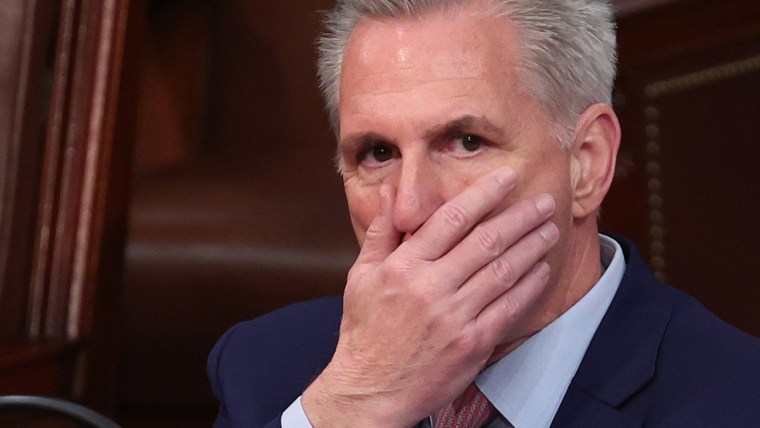Eight years ago this week, Ryan Lizza wrote a memorable piece for The New Yorker about something he described as “the ‘Young Guns’ Jinx.”
In the fall of 2010, when the Obama revolution was running out of gas and the Tea Party was ascendant, three up-and-coming House Republicans published a policy manifesto: “Young Guns: A New Generation of Conservative Leaders.” The authors — Eric Cantor, Kevin McCarthy, and Paul Ryan — were depicted together on the book’s cover casually smiling on a congressional balcony overlooking the Washington Mall.
Not long after the book was published, Republicans won a House majority. Each of the authors joined the GOP leadership. Two of the three would eventually wield the speaker's gavel.
Lizza's 2015 report added, however, that the cover of the “Young Guns” book seemed “a little like the political version of the Sports Illustrated cover jinx.”
As McCarthy prepares to resign from Congress, the idea of a “‘Young Guns’ Jinx” came to mind anew.
Two years after the book was published, Wisconsin’s Paul Ryan lost his vice presidential bid. Two years after that, Virginia’s Eric Cantor, deemed insufficiently radical by his own party’s voters in his own district, lost in a GOP primary — a rarity for a sitting congressional leader. In 2018, a frustrated Ryan announced his congressional retirement, shortly before voters elected a Democratic majority.
McCarthy’s Capitol Hill career lasted longer, but it ended in failure.
To be sure, I don’t believe that “jinxes” are real, and it’s silly to think that the “Young Guns” authors were somehow cursed. But the fiasco surrounding the Republican trio’s efforts tells a relevant story about their party’s trajectory.
When Cantor, McCarthy and Ryan wrote their book, and positioned themselves as the GOP’s future leaders, they pitched a governing vision of sorts. From a substantive position, their pitch wasn’t well thought out or based on meaningful policy research, but in 2010, Cantor, McCarthy, and Ryan genuinely seemed to believe that Republicans would thrive in the coming years by focusing on spending cuts and deficit reduction.
It would be the cause of the generation, they thought.
They thought wrong.
The trio stumbled because they didn’t see the shift in their party coming. When “Young Guns” was released — and reached bestseller lists — the idea that the Republican Party would soon be led by a buffoonish television personality would’ve seemed hopelessly ridiculous. Cantor, McCarthy and Ryan assumed they were the GOP’s future, not fringe radicals.
They soon learned otherwise. In fact, it wasn’t just the men featured on the “Young Guns” cover who faltered: The same book referenced a variety of other Republicans, touted as up-and-coming stars within the party, whose careers didn’t quite go as planned.
The list included then-Rep. Aaron Schock of Illinois, who ended up resigning under a cloud of scandal; then-Rep. Charles Djou of Hawaii, who ended up leaving the GOP altogether; and then-Rep. Adam Kinzinger of Illinois, who’s found himself completely at odds with the contemporary Republican Party.
In 2010, the GOP was preoccupied with government spending. In 2023, it’s preoccupied with grievances and conspiracy theories. It was a future the “Young Guns” authors didn’t see coming.

